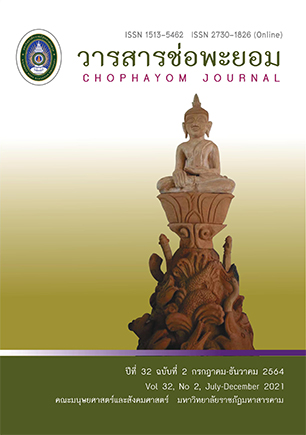Factors Influencing Crisis Management and Preventive COVID-19 Practices during COVID-19 Pandemic of Primary School Teachers in Aojiang Town, China
Keywords:
Crisis Management, COVID-19, Primary school teacheAbstract
COVID-19 pandemic is a public health emergence of international concern that never been before. Teachers have to manage crisis. The primary school teachers in China have more relationships with community than secondary schools or universities. Hence, the COVID-19 crisis management of primary school teachers are important. The aims of this research are to examine COVID-19 crisis management with identify influencing factors during COVID-19 pandemic in Aojiang town, China. The sample size was calculated, totally 300 primary school teachers from a total of 547 teachers from the 8 primary schools were selected by proportional stratified random sampling. Cross-sectional survey study was employed for the research. The questionnaire was tested for validity by 3 experts with IOC more than 0.5 and reliability by 30 secondary school teachers with Chronbach’s alpha of 0.84. Data were analyzed by descriptive statistics, Chi-square test and multiple regression by SPSS. The findings were the high COVID-19 crisis management of primary teachers. The factors influencing COVID-19 crisis management were perception and knowledge. The suggestion was schools should promote COVID-19 crisis management to make perceptions and increase knowledge.
Keywords: Crisis Management, COVID-19, Primary school teacher
References
Abdollahi, E., et al. (2020). Simulating the effect of school closure during COVID-19 outbreaks in Ontario, Canada. BMC Medicine, 18, 230-238.
Aristovnik, A. (2020). Impacts of the COVID-19 Pandemic on Life of Higher Education Students. A Global Perspective. Sustainability, 12(20), 8438-8472.
Auger, K.A., et al. (2020). Association between statewide school cl osure and COVID-19 incidence and mortality in the US. JAMA, 324(9), 859–870.
Barclay, C. (2004). Crisis management in a primary school. Teacher Development, 8(2-3), 297-312.
Centers for Disease Control and Prevention. (2019). Novel coronavirus, Wuhan, China. Retrieved 1 Feb 2020, from https://www.cdc.gov/coronavirus/2019-nCoV/summary.html.
Chen, X., et al., (2020). Hand hygiene, mask-wearing behaviors and its associated factors during the COVID-19 epidemic: a cross-sectional study among primary school students in Wuhan, China. Int J Environ Res Public Health, 17(8), 2893-2899.
Dong, L., & Bouey, J., 2020. Public mental health crisis during COVID-19 pandemic, China. Emrging Infect Dis, 26(7), 1616–1618.
Espino-Díaz, L., et al. (2020). Analyzing the Impact of COVID-19 on Education Professionals. Toward a Paradigm Shift: ICT and Neuro-education as a Binomial of Action. Sustainability, 12(14), 5646-5660.
Goh, Y., et al. (2020). The face mask: how a real protection becomes a psychological symbol during Covid-19?. Brain Behav Immun, 88, 1–5.
Jones, G.R., & George, J.M. (2006). Contemporary Management. New York: McGraw-Hill.
Liu, L., & Jiang, M. (2017). Crisis Management of Group Events in Chinese Universities Under the Background of Internet: A Literature Review. Higher Education of Social Science, 13(2), 23-28.
OECD Handbook. (2018). The Value of Culture and the Creative Industries in Local Development. Bolzana and Trento, Italy: OECD Center of Entrepreneurship, SME’s, Regions and Cities Activities.
Szepietowski, J.C., et al. (2020). Face mask-induced itch: a self-questionnaire study of 2,315 responders during the COVID-19 pandemic. Acta Derm Venereol, 100(10), 152-160.
Tong, T. (2015). The relationship between college campus crisis, coping style and the subjective well-being of counselors. Shandong: Shandong Jianzhu University
Wang, Z. Y. (2013). The Study of University Campus Crisis Response. Jiangsu: Nanjing University of Technology.
Wang, L. (2019). The research on crisis management on high school campus based on 4R theory. Heilongjiang: HeiLongJiang University
Wang, C., et al. (2020). Immediate psychological responses and associated factors during the initial stage of the 2019 coronavirus disease (COVID-19) epidemic among the general population in China. Int J Environ Res Public Health, 17(5), 17-29.
Wang, C., et al. (2020). A novel coronavirus outbreak of global health concern. Lancet, 395(10223), 470–473.
WHO. (2020). Novel Coronavirus–China. Retrieved 21 June 2020, from https://www.who.int/csr/don/12- january-2020-novel-coronavirus-china/en/.
WHO. (2020). WHO Coronavirus Disease (COVID-19) Dashboard. https://www.who. int/emergencies/diseases/novel-coronavirus-2019. Retrieved 21 June 2020, from
Wu, J., Bhuyan, S.S., Fu, X. (2020). Enhancing global health engagement in 21st century China. BMJ Glob Healt, 5(3), 2194-2199.
Yang, X., et al. (2020). Social support and clinical improvement in COVID-19 positive patients in China. Nurs Outlook, 68(6), 830-837.
Yunnan's Statistics Bureau. (2018). Yunnan's statistics yearbook, 2015. Beijing: China Statistics Press.
Zhang, W. (2018). Research on the History of Education Management in China: Looking Back and Looking Forward. China Social Science Journal, 7(2), 112-118.
Zhang, J., et al. (2020). Changes in contact patterns shape the dynamics of the COVID-19 outbreak in China. Science, 368(6498), 1481–1486.






